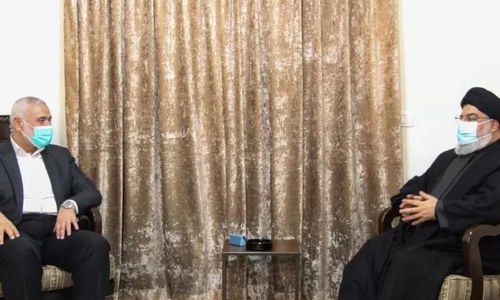Lebanon and Israel, still technically at war, begin unprecedented talks sponsored by the UN and Washington on Wednesday to settle a maritime border dispute and clear the way for hydrocarbon exploration.
Following years of US shuttle diplomacy, Lebanon and Israel, this month said they had agreed to begin UN-brokered negotiations, in what Washington hailed a “historic” agreement.
The talks, which will be held at the headquarters of UN peacekeeping force Unifil in the Lebanese border town of Naqura, come weeks after Bahrain and the United Arab Emirates became the first Arab nations to establish relations with Israel since Egypt in 1979 and Jordan in 1994.
This has prompted suspicions that the flurry of US-sponsored diplomacy relating to Israel is linked to President Donald Trump's re-election campaign.
The Naqura talks, which will focus exclusively on the disputed sea frontier, come at a sensitive time as Lebanon, battered by multiple crises, hopes to continue exploring for oil and gas in a part of the Mediterranean also claimed by Israel.
US envoy David Schenker will facilitate the opening session along with US Ambassador to Algeria John Desrocher, who will mediate in the talks.
Israel has said that there will be “direct negotiations”, something Lebanese officials have denied. It is expected the two delegations will be sitting in the same hall.
Talks are due to start in the morning, but no specific time has been made public.
Israel is sending a six-member team, including the director-general of its energy ministry, Prime Minister Benjamin Netanyahu's foreign policy adviser and the head of the army's strategic division.
Lebanon's four-member delegation comprises two army officers, a Lebanese oil official and a maritime border law expert.
'We have no illusions'
Israel and Lebanon have no diplomatic relations and this week's talks are a rare official interaction. Lebanon insists that negotiations are purely technical and don't involve any soft political normalisation with Israel.
Lebanon, mired in its worst economic crisis since the 1975-1990 civil war, is looking to settle the maritime border dispute so it can press its offshore quest for oil and gas.
In February 2018, Lebanon signed its first contract for drilling in two blocks in the Mediterranean with a consortium comprising energy giants Total, ENI and Novatek.
Exploration of one of the blocks is more controversial as part of it is located in an 860-square-kilometre area claimed by both Israel and Lebanon.
A senior source at Israel's energy ministry told AFP that the border dispute “can be concluded hopefully in a few months time”.
“This is a limited effort to resolve a well-defined, limited problem,” he said.
“We have no illusions. Our aim is not to create here some kind of normalisation or peace process.”
Hilal Khashan, a political science professor at the American University of Beirut, said that an agreement between the two sides is the “best option for Lebanon so that it could start work in Block 9”.
But he questioned the timing, saying it was likely scheduled by the Trump administration ahead of presidential elections so it can chalk up a “new foreign policy accomplishment”.
Mixed reaction
Reactions to the talks have been mixed in Lebanon, still reeling from a huge August 4 explosion at Beirut port that killed more than 190 people and dealt another crippling blow to Lebanon's crisis-hit economy.
Hezbollah critics on social media have described the talks as contrasting with the powerful Iran-backed movement's anti-Israel stance.
The pro-Hezbollah Al-Akhbar daily on Monday called them “a moment of unprecedented political weakness for Lebanon”, arguing that Israel is the real “beneficiary”.
Hezbollah is both an armed group that has fought several wars against Israel and a major force in Lebanese politics, with seats in parliament.
On Thursday, its parliamentary bloc stressed that demarcating Lebanon's disputed maritime border with Israel does not signify “reconciliation” or “normalisation”.
Following a 2006 war, regular talks between Israeli and Lebanese army officers were reestablished under Unifil's auspices.
As well as the discussions on the maritime border to be facilitated by the US, a Unifil-brokered track is also due to address outstanding land border disputes.
Khashan of AUB said these negotiations would be more complex as they would undoubtedly raise the issue of the formidable arsenal held by Hezbollah, the only Lebanese group not to have disarmed after Lebanon's civil war.
“Hezbollah will not agree to give up its arsenal,” he said.














































